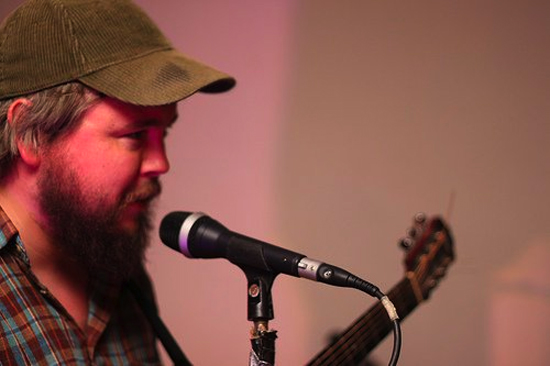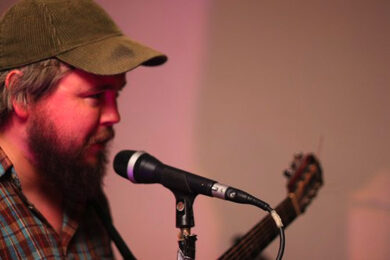Richard Dawson is a singer with a voice that’s both gentle barfly croak and Icarus-soaring croon, vocal cords that have been roughly mulled by a ragged red wine as opposed to a thing made arid by whiskey. As a guitar player he’s evolved from homespun folk tales to a man whose playing has recently altered into a (possibly) car battery powered finger-picked electric and messy blues.
His musical path, having been something of an out-there-and-back-again kind of journey, has seen him release a split record with Jazzfinger, create theatre production soundtracks (2009’s Motherland on his own label, Pink Triangle) and go pseudonymous with Éliane Radigue-tinted layered drone under the Eyeballs alias. There were a handful of conventional tracks throughout this period, but it was when he returned to the song/guitar formula with 2011’s The Magic Bridge that Dawson, already a local hero of sorts in his hometown of Newcastle, really caught the wider musical community’s attention. These steadily growing embers of interest led to standout performances at 2012’s KRAAK, Tusk and Supersonic festivals.
Given the offer of searching the archives of the Tyne & Wear Archives & Museums and to "respond with half an hour of sound for broadcast", Dawson has come out the other side with a new album, The Glass Trunk. An LP of seemingly disparate ideas – Dawson’s acapella stories drawn from the archive, some vocal duets and a series of spikily exploratory instrumentals of Dawson’s guitar and Rhodri Davies’ amplified pedal harp – The Glass Trunk ebbs and flows where you’d expect it to jar.
Was the idea of having your song’s inspiration given to you an initial shit-yerself moment, or as a writer are you up for that sort of challenge?
Richard Dawson: Sometimes, when you do the music for a play, for example, there are very clear boundaries as to what needs to be achieved, so that’s very different. You’re very much a little cog in a much bigger machine. Here it was more a case of John Coburn of The Discovery Museum and Lee Etherington of Tusk trusting me to make something interesting and leaving me to it. I wanted to make something that was explicitly about and for my community. The suggestion of the project came along just at the right time, [I] felt like I’d been trying to do a jigsaw blindfolded before that. So it was kind of a magical confluence! Is that the right word?
I’d already been thinking quite seriously about doing a solo vocal album, and knew the themes and messages I wanted to convey, although I’d put this on the back-burner as I was already underway with another guitar and voice album. The idea kept poking its head up though, and then when I was approached to take part in this project, the overwhelming feeling was that it had already taken place, that things were rolling how they are meant to, that the album already existed and already had been making this album in my head – it was very right.
One of the easy highlights of the album is the opener ‘A Parent’s Address To His Firstborn Son On The Day Of His Birth’. How did that song come about? Am I right in thinking there’s a Gaelic Psalm influences in there?
RD: Yeah, you could say there’s an element of Gaelic Psalms in there, though that wasn’t at the forefront of my thinking whilst making the song. Rhodri lent me a bunch of discs a couple of years ago and one of them was Gaelic Psalms From Lewis, which is stunning, although the CD which really got me out of that batch was a recording of the King David Harp on the Éthiopiques CD series. So yeah, I’m sure it’s in there somewhere but much more pertinent would be things like Sacred Harp, Tenores di Bitti and Huun-Huur-Tu. Also, one major inspiration behind all of this was Mike Waterson’s solo vocal album from the 70s. It begins with a single voice leading into a group chorus; it’s a rousing intro before he really gets into the meat and bones of the album.
On a much more practical level, that song came about after coming across a letter written in verse by a brand-new dad. His joy is palpable – not just through the words he’s written but also the handwriting, little splashes and dots of ink here and there, and the energy the piece of paper still possesses. It was one of the first things I came across in my hunting. It was actually the first day I spent in the archives that I found it, and it was quite apparent what needed to be done! So, very quickly I had my starting point.
How quickly did these songs come together? It feels like quite a short period of time between the first time the project was announced and this album being ready.
RD: I did three weeks solid research in the archives, collecting things in my little purple book (and lots of photocopies) and started writing in earnest around the start of August. I dipped back into the archives from time to time, handling the things, just maintaining a feel for the artefacts. I would say I spent around two weeks on each song, although some were quicker – ‘A Parent’s Address…’ was a week or so of chiselling and honing and ‘Poor Old Horse’ was quite quick too. Some were slower – ‘The Ice-Breaker Baikal’ and ‘Joe The Quilt-Maker’. A big part of it was practising the songs as well; they’re all quite challenging in their own ways so it took a lot of getting up to speed. I was pretty much finished around the start of December and booked in to record from the 15th to the 18th. So it was really intense, my days were full of it. It’s kind of stressful pushing your brain when it doesn’t want to know, but really rewarding too.
So, how did the guitar/harp duets with Rhodri Davies come about? And how did it fit into this album’s concept? It’s pretty different to the other music.
RD: Since Rhodri moved here a few years ago we’ve gotten quite close, he is somewhat of a kindred spirit. We tried a couple of years ago to do something together but it just didn’t work, we were each focused on particular areas of sound and it just didn’t fit together, you know? But we kept on mulling over the idea. As this album started to take shape it became clear that the songs needed a counterpoint – primarily to underpin the themes of opposing forces, creation and destruction, birth and death, composition and improvisation, and that of mirror images. I was also interested in the idea of placing something refined next to something primal and how the lines between those things might blur and converge. There are a number of other structural reasons, how the painting fills the canvas, its shape from across the room, you know!
The duets also serve to blast the palette clean between each song – although I must stress that’s merely a happy by-product and not the reason for their inclusion. There’s another side too, and this applies to the first track with everyone singing on and ‘The Ghost Of A Tree’ with Sarah Hill’s vocals – music as an expression of friendship and familyship.
So are the experimental Eyeballs days over? It certainly seemed for a period like the concept of ‘the song’ had been put to one side for a while – was that the case?
RD: Maybe Eyeballs is over. The thing is, that doesn’t seem like such a sad thing, does it? I reckon there are people working in the same field doing much more interesting work, and much more distinctive things too. It was a nice thing but very light really. I’ve never stopped working on songs and practising singing and guitar, but yes, definitely lost focus. Not now though. I feel very much like, this is me now… I know what I’ve got to do. I’ve got lots more work to do. Need to keep pushing.
The Glass Trunk is out now
Richard Dawson plays Bring To Light festival in Birmingham this weekend from October 25-27; for full details and tickets, head to the event’s website



